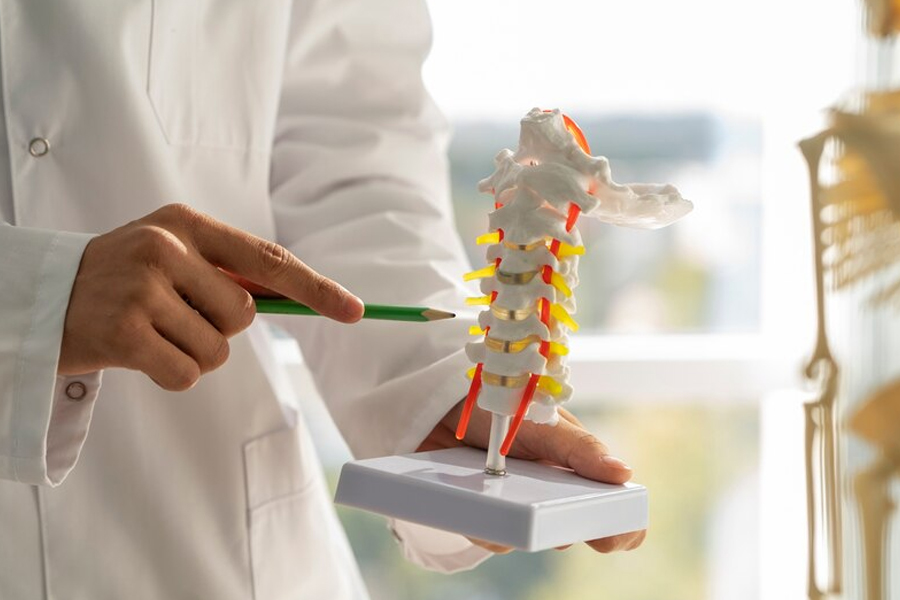
Excessive fat in the upper arms, especially when coupled with obesity, can contribute to various health issues, including an increased risk of spinal fractures. The connection between arm fat and spinal health may seem surprising, but the underlying factors, such as body weight distribution, muscle imbalance, and bone density, play crucial roles.
Table of Content:-
To understand how this can occur and how to prevent it, OnlyMyHealth interacted with Dr Dhananjay Parab, Orthopaedic and Knee Replacement Surgeon, Zynova Shalby Hospital, Mumbai. He offered insight into the possible connections between excessive arm fat, overall body weight, and spinal health.
The Link Between Arm Fat and Spinal Fractures

Research suggests that excessive fat accumulation in any part of the body, including the arms, can indicate an overall weight gain that may negatively affect spinal health. While there isn’t a direct link between arm fat specifically and spinal fractures, being overweight or obese can put additional stress on the spine. "Excessive body weight can lead to increased pressure on the spine, contributing to the weakening of bones over time. This, in turn, can heighten the risk of spinal injuries and fractures," says Dr Parab.
Carrying excess weight, particularly around the abdomen and other areas, can result in an imbalance in the body’s centre of gravity, which places undue stress on the spine. Over time, this can lead to conditions such as osteopenia or osteoporosis, where bones become brittle and more susceptible to fractures. "The spine is the pillar of our body, and any excess weight that it needs to support can compromise its structural integrity," Dr Parab adds.
Also read: Suffering From Obesity? How To Boost Fat Burning Hormones In Your Body
The Importance of Overall Weight Loss

Spot reduction, or the idea that one can lose fat from a specific area like the arms, is largely a myth. Fat loss tends to occur uniformly across the body. Therefore, focusing on overall weight loss is essential for reducing arm fat and improving spinal health.
To achieve this, making healthy dietary choices is paramount. A diet rich in green vegetables, fruits, nuts, seeds, lentils, legumes, and whole grains can aid in weight loss and improve bone health. These foods are packed with essential nutrients like calcium, magnesium, and vitamins D and K, which are crucial for maintaining strong bones. Dr Parab emphasises, "Nourishing your body with the right foods not only aids in weight management but also fortifies your bones against potential damage."
Conversely, it's vital to avoid junk foods that are high in sodium, sugar, and unhealthy fats. Foods such as chips, burgers, pizza, and sweets can contribute to weight gain, increased blood pressure, and a higher risk of type 2 diabetes, which further complicates bone health.
Also read: Are You Taking Care of Your Spine? 7 Essential Tips to Follow
Exercise: A Key to Fat Reduction and Bone Strengthening

In addition to a balanced diet, regular exercise plays a critical role in reducing overall body fat and strengthening bones. Engaging in physical activities for at least 45 minutes a day can help burn calories and promote fat loss. Activities like walking, running, swimming, and yoga are excellent options. Strength training, in particular, is beneficial as it not only aids in fat loss but also improves bone density.
"Exercise is a non-negotiable aspect of maintaining both a healthy weight and strong bones. It helps reduce the strain on your spine and enhances the musculoskeletal system’s overall resilience," advises Dr Parab.
Conclusion
While arm fat alone is unlikely to cause spinal fractures, it can be an indicator of broader weight-related issues that may compromise spinal health. By focusing on overall weight loss through a combination of healthy eating and regular exercise, individuals can reduce arm fat and lower their risk of developing spinal problems. As Dr Parab notes, "Prioritising your health through weight management and exercise is the best way to protect your spine and ensure long-term well-being."
Also watch this video
How we keep this article up to date:
We work with experts and keep a close eye on the latest in health and wellness. Whenever there is a new research or helpful information, we update our articles with accurate and useful advice.
Current Version
